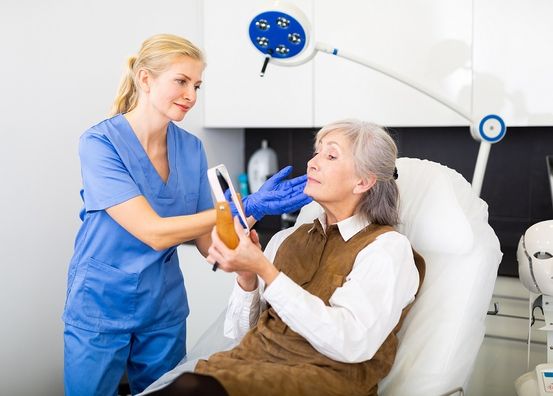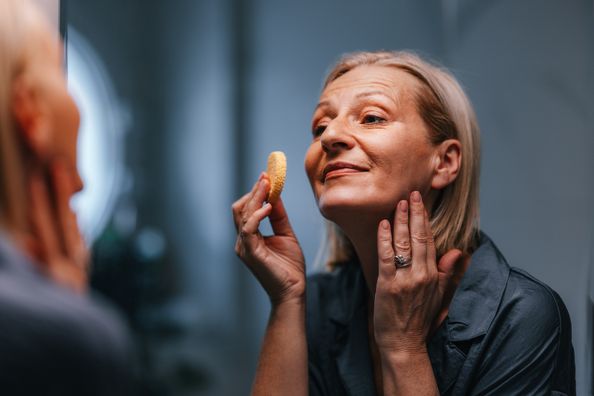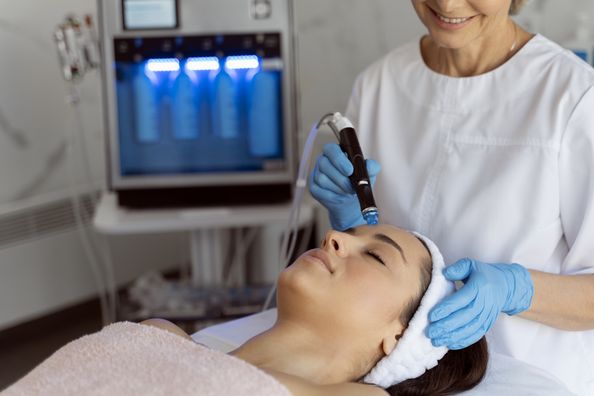Snow castles, hot cocoa, time with loved ones — there are plenty of things to love about the winter. However, if you’re one of the many people who suffer from dry skin, this season may not exactly be your favorite.

Dry skin is common. It is also the most common cause of itching, including winter itch. When you address dry skin first, it can often successfully ease uncomfortable feelings of itch and pain. Symptoms of dry skin can be minor, with slight flaking and discomfort, or it can take a serious toll, leading to embarrassment and discomfort that interrupts your daily life.
No matter how you’re experiencing dry skin, it can be frustrating at the very least.
By learning about the signs of dry skin, you can start treating it as soon as possible. If home treatment isn’t successful, a Duly Health and Care dermatologist can determine if your dry skin is a sign of a condition, offer preventive tips, and find the right skin treatment for you.
Here are some signs of dry skin and how you can keep your skin healthy year-round.
What Are the Signs of Dry Skin?
Most people have experienced dry skin at one time or another. From itchiness to flaking skin, the signs of dry skin are common and well-known.
However, dry skin can come with other symptoms, too, including:
- Fine lines
- Rough or loose skin texture
- Cracks, which can become deep and bleed
- Peeling skin
- Excessive itchiness
- Pain, stinging, or burning sensation
- Skin infections, which can look like yellow crusts, areas of pus, or swelling
You can have dry skin anywhere on your body, but the most common areas are your hands, arms, lower legs, and abdomen.
What Puts You at Greater Risk for Dry Skin?
Your skin has a thin protective barrier made of natural lipids or fatty substances. By protecting your skin, these natural lipids keep your skin moisturized and soft.
If these lipids are stripped away — due to a health condition, genetics, environmental factors, or your skin routine — that can cause dry skin.
You might have dry skin because you’re:
- Washing with harsh soaps
- Taking long, hot showers
- Not using moisturizers
- Misusing moisturizers (such as by only using them when symptoms arise instead of every day, especially on damp skin)
Are you experiencing very dry skin? If it’s becoming excessive and home treatments aren’t working, it might be time to see a Duly dermatologist. Schedule an appointment today.
Some people also have a greater chance of developing excessively dry skin if you:
- Have a skin condition that makes you itch, like atopic dermatitis
- Smoke cigarettes
- Are in your 40s or beyond, when your skin makes less oil
- Have recently spent time outdoors in the cold when less moisture is in the air
- Wash your hands frequently
- Have vitamin deficiencies, such as vitamin D, vitamin A, or iron
How Can You Keep Your Skin Moisturized?
We all want healthy skin that not only looks good but also feels good. Dry skin can happen during any month, but it’s more common in the winter months.
Protect your skin from getting too dry in the winter (and year-round):
- Use a gentle cleanser. When washing, use a mild cleanser that’s fragrance-free.
- Apply moisturizer. Use a moisturizer after washing your hands and immediately after taking a shower or bath.
- Avoid wearing tight clothes. Tight clothes like leggings and jeans can rub against your legs. You’ll also want to avoid wearing anything made of wool or polyester, which can irritate your skin.
- Use a humidifier. Humidifiers increase the humidity level which can help keep your skin moisturized.
- Protect your skin from cold air by wearing appropriate clothing, such as gloves.
What Happens to Untreated Dry Skin?
Untreated dry skin won’t get better on its own. In fact, it might even get worse. Itchiness can lead to scratching, which can cause infections and patches of permanently itchy skin.
The good news is that most people see improvement when they follow a treatment plan. If at-home treatment isn’t working, talk to your provider about what you can do to treat your skin and protect it from getting worse. If you have developed excessively dry skin, one of our board-certified dermatologists can talk to you about treatment options.
How Your Duly Dermatologist Can Help Your Chronic Dry Skin
If you have been battling dry skin and nothing seems to work, it might be time for a more specific treatment plan. One of our board-certified dermatologists can recommend products or services to treat your dry skin.
No one should have to suffer from dry skin. By being proactive about keeping your skin moisturized and treating dry skin if it does occur, you’ll have healthy skin you can feel comfortable in all year long.
Health Topics:








